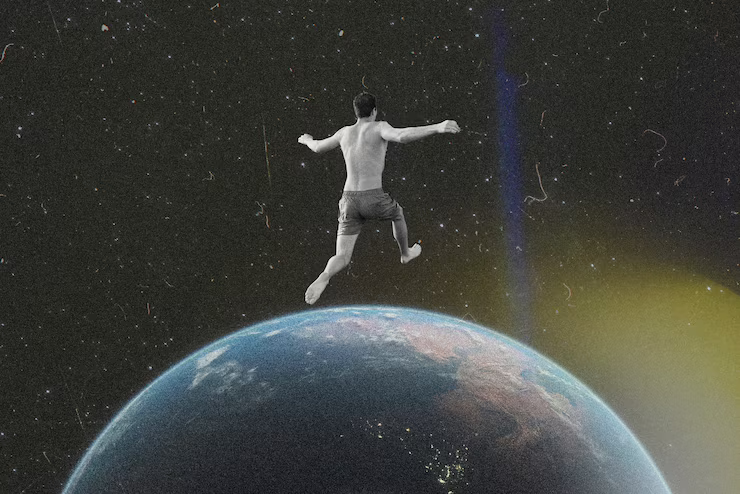
Let’s suspend reality for a moment and imagine the unimaginable: what if gravity — the force that keeps us grounded, literally — suddenly disappeared?
We’re talking about an instant, total vanishing of gravity, not a gradual loss or a temporary glitch. Just — poof, gone. No gravity pulling you to the Earth, no force holding the Moon in orbit, no weight, no up, no down. It’s a scenario that dances on the edge of science fiction, but thinking through it offers a fascinating glimpse into how deeply gravity is wired into every part of existence as we know it.
The Immediate Human Experience
If gravity suddenly ceased, the effects on humans — and everything else — would be immediate and surreal. First, we’d all begin floating. Not gently, like astronauts in the International Space Station, but rapidly, like balloons released into the sky. You’d lift off your chair, your phone would shoot upward, the water in your glass would form blobs in mid-air. Everything not physically anchored — and let’s face it, most things aren’t — would be airborne within seconds.
But unlike in space, where astronauts float in a controlled microgravity environment, this would be utter chaos. Windows would shatter from flying objects. Cars would lose contact with roads and collide mid-air. Water from oceans, lakes, and even the plumbing in your bathroom would start to float, forming massive, drifting blobs of water vapor. The air itself, which is held close to Earth by gravity, would begin to disperse into space. Yes, you’d have trouble breathing almost immediately.
So, in the first few seconds, humans would be panicking mid-air, colliding with walls, ceilings, and each other — until the lack of oxygen hits. That’s right: we’d be suffocating, even as we floated like astronauts in a malfunctioning space simulation.
The Planet’s Reaction: Earth Gone Wild
Let’s zoom out and look at the Earth itself. Our planet is held together by gravity — it’s what gives it shape, structure, and stability. Without it, the crust wouldn’t just sit there politely. The molten core, the oceans, the land — everything would explode outward in all directions. Earth would essentially disintegrate.
In a terrifying moment, mountains would crumble, oceans would tear themselves from the seabed, and the atmosphere would begin leaking into space like steam from a punctured kettle. The Moon, no longer bound by Earth’s pull, would drift off into space. And the same fate would apply to our artificial satellites, which would veer off their orbits in chaotic trajectories.
What’s worse? The Earth wouldn’t even continue to orbit the Sun. Instead, it would shoot off in a straight line, flinging whatever remained of its surface — or atmosphere — into cold, dark space. The solar system, once a delicately balanced ballet, would descend into disarray, with planets veering off course and colliding over eons.
No Gravity = No Time?
Here’s where it gets even weirder. According to Einstein’s theory of general relativity, gravity and time are intimately connected. The presence of mass (and thus gravity) warps space-time, which affects how time flows. So if gravity were to disappear, space-time itself might be fundamentally altered.
Time, as we experience it, could become meaningless. Clocks might stop ticking — not because they’re broken, but because time might stop “flowing” as we understand it. It’s impossible to say exactly how this would unfold, but the collapse of gravity would most likely mean a breakdown of the very fabric of reality.
Could This Ever Happen?
The good news? No. Gravity isn’t something that can be switched off. It’s not a force like electricity or magnetism that can be disrupted or reversed. Gravity is the curvature of space-time itself, a fundamental feature of the universe. As long as mass exists — and it always will — gravity exists.
There are some theories in advanced physics that flirt with the idea of modifying gravity, such as in quantum gravity or hypothetical fifth forces. But even those don’t predict a world where gravity completely vanishes. It’s stitched into the cosmos at every level.
Still, as a thought experiment, it helps us appreciate just how much we take this invisible force for granted.
What About the Universe?
If gravity disappeared not just on Earth but across the entire universe, we’d be witnessing the undoing of creation itself. Galaxies would fall apart. Stars — including our Sun — would no longer be able to hold themselves together, and would explode in supernovae or collapse instantly. Black holes would vanish, as they are defined by their extreme gravitational pull.
Eventually, all matter in the universe would scatter randomly, like a sandcastle hit by a rogue wave. No stars, no planets, no galaxies — just atoms drifting eternally in a dark, structureless void.
This might resemble the concept of “heat death” — a theoretical end state of the universe — but sped up and made even more violent by the suddenness of the change.
So… What’s the Point of This Thought Experiment?
Why even entertain this seemingly absurd question? Because it reminds us of how interconnected everything is. Gravity isn’t just some background effect. It’s the reason you’re reading this post with your feet planted on the ground and not spinning helplessly through your ceiling. It’s the reason planets orbit stars, tides rise and fall, and time even makes sense.
And sometimes, imagining the impossible helps us better understand what is possible — and what makes our corner of the universe not just functional, but beautifully stable.
We may not feel gravity in our day-to-day awareness, but its absence — even hypothetically — reveals just how miraculous our universe really is.
Leave a Reply